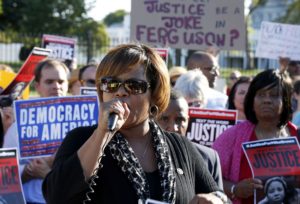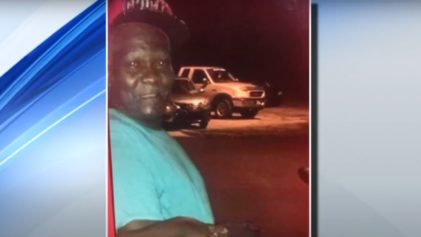
Her latest call for change will move her from the streets of Ferguson to the State Capital in Jefferson City.
Protests swept across the nation when a grand jury decided not to indict Ferguson police officer Darren Wilson in Brown’s death and, while much spotlight was geared towards the celebrities who joined protesters in the streets of Ferguson, it was Nasheed’s presence that truly served as a beacon of hope.
The Missouri lawmaker made it clear that she stood in solidarity with the people of Ferguson and all members of the Black community who are tired of injustices that plague their communities.
Back in October, cameras were snapping away as the lawmaker was carried away and arrested for peaceful protest outside of the Ferguson Police Department.
Nasheed sat down in the middle of the street and refused to move. That’s when officers cuffed her and took her away.
“I went to Ferguson to get arrested,” she said. “I wanted to show protesters how to get arrested. I want my involvement to convey that it is okay to be angry. It’s okay to be frustrated, and to let them know they can protest in a peaceful manner.”
Nasheed’s next step on the journey for justice will reach the state legislature in Jefferson City.
Nasheed pointed out that Missouri’s current laws are framed in a way that works to protect police and give them the right to shoot suspects even if the officer’s life is not in danger.
“The way the Missouri statute is written right now it states, ‘Deadly force is immediately necessary if the officer reasonably believes the suspect has committed or attempted to commit a felony,’ “ she explained, according to News One. “That law allows the officer to shoot a fleeing suspect, and it supports Darren Wilson’s explanation for shooting Michael Brown.”
She went on to explain that the law also contradicts a 1985 Supreme Court ruling that determined an officer didn’t have the right to shoot a fleeing suspect.
Last week Nasheed filed Senate Bill 42 that would “align the state statute with the federal law” and also contains a provision that would require any officer who kills a suspect within 20 feet is placed on unpaid suspension until an investigation is completed.
Placing more restrictions on police use of force isn’t the only change that Nasheed hopes to bring to what seems to be a racially biased justice system.
Nasheed also said that the very process to indict an officer needs a serious overhaul.
Many critics have slammed the current process as a way that allows the “police to police the police” and thus means the system works to protect officers at all cost.

A Black man fatally shot McCullough’s father, who was a police officer.
“We have had the opportunity to see throughout the years the deep connections Bob McCullough has with the law enforcement officers throughout the country,” she said. “You know, that shouldn’t be a problem. They should have a good relationship. However, when you have such a close relationship with law enforcement and prosecutors sometimes you find a gray area where the prosecutor can become very impartial.”
Nasheed hopes the proposed legislation could be yet another crucial step towards mending the relationship between the Black community and police officers, especially throughout the state of Missouri.
Meanwhile, she is also advocating for serious changes to the way police officers generate revenue in the villages that surround the St. Louis area.
“[Those police departments] bring in revenue on the backs of poor, indigent young men and women,” Nasheed said. “They create checkpoints, and you can’t make a U-turn. You have to go through the checkpoint. A lot of times you have young men and women who are extremely indigent and they may be driving without insurance.”
She went on to explain that many of the residents make “less than $8 an hour and they can’t afford insurance.”
They receive a summons to appear in court and often don’t show because they can’t afford to pay the hefty fines and are eventually jailed with $2,000 bonds.
Nasheed said the key is to “eliminate the villages and designate them as part of the unincorporated county. That way the county manages the fines, the courts, and you don’t have a lot of checkpoints throughout the county.”


